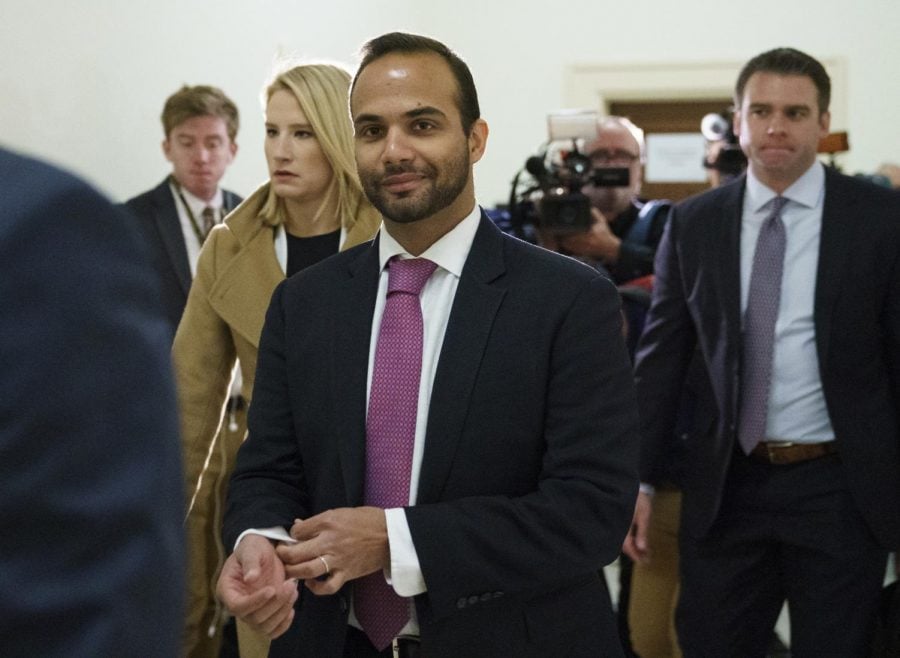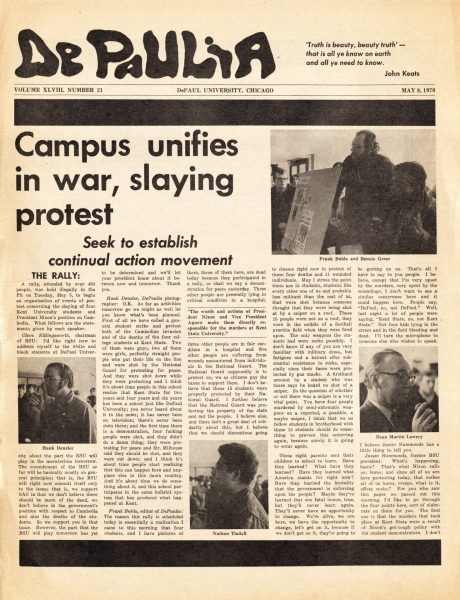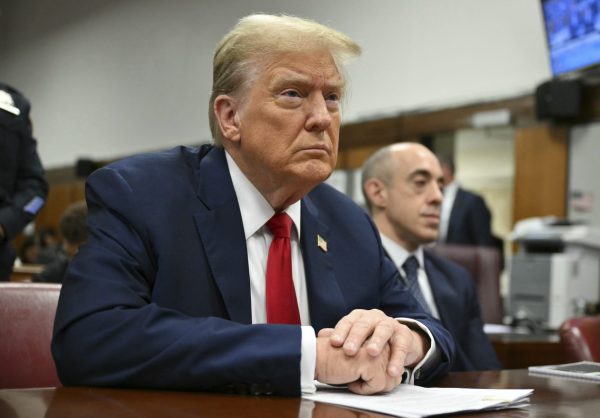DePaul alum running for Katie Hill’s congressional seat
In this Oct. 25, 2018 file photo, George Papadopoulos, the former Trump campaign adviser who triggered the Russia investigation, arrives for his first appearance before congressional investigators, on Capitol Hill in Washington.
George Papadopoulos, a former DePaul student who was a foreign policy adviser to President Donald Trump and a key figure in the Mueller investigation, has filed to run for Congresswoman Katie Hill’s newly-vacant seat.
Hill resigned from her seat in California’s 25th congressional district in late October after leaked photos outed her relationship with a member of her staff. Papadopoulos served 14 days in prison after pleading guilty to lying to the FBI during special counsel Robert Mueller’s investigation into the Trump administration’s dealings with Russia during the 2016 presidential election.
Though Papadopoulos became involved with the Trump administration as a foreign policy advisor in March 2016, he did not leave a strong impression during his time as a student at DePaul. Papadopoulos graduated from the university with a degree in political science in 2009.
Dick Farkas, a political science professor at DePaul who taught Papadopoulos in classes which focused on Russian foreign policy, described him as “very passive” and said he would make a poor candidate for a seat in Congress.
“I think he’s a particularly inappropriate candidate,” Farkas said. “I think there are a host of things one would hope for in a congressional candidate – indeed an ultimate congressperson – that George doesn’t have. I think his credentials won’t stand up to scrutiny. I think his track record is a record of inexperience.”
Papadopoulos worked as a foreign policy adviser for former presidential candidate Ben Carson’s campaign. Prior to that, he was an unpaid intern at the Hudson Institute from 2011 to 2015 and later worked as a contract research assistant to a senior fellow at the institute. He was also an oil and gas consultant at London energy consultancy Energy Stream for four months before joining Carson’s campaign.
In January, Papadopoulos joined the board of a medical marijuana startup, according to The Hill.
Trump described Papadopoulos as “an oil and energy consultant, an excellent guy” during a 2016 interview with the Washington Post editorial board.
The White House tried to distance itself from Papadopoulos after the start of the Mueller investigation; then-press secretary said his role within the campaign was “extremely limited” and that it was a “volunteer position.”
U.S. District Judge Randolph Moss said that Papadopoulos’ deception was “not a noble lie” and that he had lied because he wanted a job in the Trump administration and didn’t want to jeopardize that possibility by being tied to the Russia investigation.
“In some ways it constitutes a calculated exercise of self interest over the national interest,” the judge said during the sentencing.
The seat Papadopoulos is running for has traditionally been a Republican stronghold. Hill flipped the seat during the 2018 midterm elections after it had been in GOP hands for 26 years, helping Democrats win a majority in the House, according to CNBC.
However, Papadopoulos may already have a Republican opponent. Steve Knight, who held the seat before Hill won it in 2018, told the Santa Clarita Valley Signal that he is strongly considering running.
The fact that Papadopoulos has been to federal prison may hinder his chances of being approved to run for Congress, however.
The U.S. Constitution has three requirements for those wanting to run for office: being at least 25 years old, having been a citizen for at least seven years and living in the state one hopes to represent. States may add additional requirements, including prohibiting felons from running for office.
California passed a law in 2012 that prohibits felons from having their name on a ballot for office until at least 20 years after the crime was committed if it includes the following crimes: payment or receipt of bribes, fraud, theft of government property, financial conflicts of interest, tax offenses, false claims, perjury, receipt or payment of kickbacks on government contracts and money laundering.
It’s unclear if lying to the FBI would fall under the crimes in the bill.
Republicans had four candidates in 2018 who had previously been convicted of crimes: Joe Arpaio, who ran for reelection of Sheriff of Maricopa County in Arizona; Don Blankenship, the former head of the coal mining company Massey Energy who ran in the Republican primary to challenge Sen. Joe Manchin (D-W.Va.); former Rep. Michael Grimm, who challenged incumbent Rep. Dan Donovan (R-N.Y.) to reclaim the Staten Island congressional seat he once held; and Rep. Greg Gianforte (R-Mont.), who ran for re-election.
Out of the four, only Gianforte won his race.











